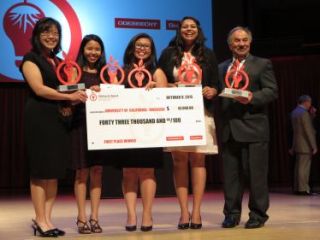Oct 14 2015
A team of University of California, Riverside Bourns College of Engineering students won a national sustainable development award last week for creating a device that drastically reduces harmful emissions from lawnmowers.
 The NOx-Out team receives its award with their advisor, Kawai Tam, and Reza Abbaschian, dean of the Bourns College of Engineering.
The NOx-Out team receives its award with their advisor, Kawai Tam, and Reza Abbaschian, dean of the Bourns College of Engineering.
The team — Alyssa Yan, Priyanka Singh, Anna Almario — their advisor and the University will receive $43,000 for winning the Odebrecht Award for Sustainable Development. They learned they received the award during an Oct. 8 award ceremony in Miami, where they were accompanied by Kawai Tam, their advisor, who is a lecturer at the college, and Reza Abbaschian, dean of the college.
“This win is a testament to our college’s commitment to hands-on undergraduate research that can be applied in the real world,” Abbaschian said. “With a single device, these students can significantly improve our air quality and have the potential to revolutionize an industry that has been around for more than 100 years.”
The team traveled to Miami as one of three finalists for the award. The others were teams from Duke University and the University of California, Berkeley.
The students developed the device — a cylindrical stainless steel unit that attaches to the lawnmower where its muffler was — because small engine devices produce significant harmful emissions. For example, the Environmental Protection Agency estimates that a gasoline powered lawn mower emits air pollution equivalent to a single car driven for 45 miles for each hour of operation.
This unit could also be attached to other small engine devices such as generators. Reduction of nitrogen oxide, carbon monoxide, volatile organic compounds and particulate matter would positively impact human health, and reduce environmental concerns such as smog formation and acid rain.
The team, which calls itself NOx-Out (NOx is short for nitrogen oxide, a harmful emission), believes there is a market for the device for lawnmower manufacturers and current lawnmower owners, especially operators of landscape companies, who could retrofit their existing gasoline-powered lawnmower.
They expect the device, which has the added benefits of reducing noise from the lawnmower and the smell of gasoline, would sell for about $80 for its current scale of production. This price would substantially be lower at a larger scale of production.
“To be recognized by prestigious industry leaders validates that our idea has innovative merit toward sustainability,” Tam said. “With this award, our team will be continuing our efforts toward commercialization.”
The device can be thought of as a three stage system. First, a filter captures the harmful pollutants. Then an ultra-fine spray of urea solution is dispersed into the exhaust stream. The urea spray primes the dirty air for the final stage, when a catalyst converts the harmful nitrogen oxide and ammonia into harmless nitrogen gas and water and releases them into the air.
Testing by the students has shown that the device eliminates 93 percent of particulate matter emissions. Tests using a previous version of the device found it reduced carbon monoxide emissions by 87 percent and nitrogen oxide emissions by 67 percent.
Several teams of former Bourns College of Engineering students have worked on the device in recent years.
In 2013, a team won two first place awards at the WERC: A Consortium for Environmental Education and Technology Development competition in Las Cruces, N.M. It’s run by the Institute for Energy & the Environment (IEE).
The following year, a new team won a phase one $15,000 grant as part of the EPA’s P3 (People, Prosperity and the Planet) competition. The current team — Almario, Singh and Yan — took over from that team and earlier this year received an honorable mention award for the EPA P3 phase two competition. (If they had been one of seven winning teams they would have received $75,000.) They also won the first place team award at this year’s Eco Innovators / Spring Green Expo, which is hosted by the Metropolitan Water District of Southern California.
Launched in 2012, the United States edition of the Odebrecht Award for Sustainable Development is granted to applicants that demonstrate innovative technologies and business models for sustainable development. The Odebrecht Organization seeks to reward projects that are environmentally sustainable, profitable, produce quantifiable results, and have the potential to be scaled up and replicated for broad applications. Odebrecht and Braskem, Brazilian companies in the fields of engineering, construction, chemicals and petrochemicals, are looking for ideas that can be implemented in various real-world ventures.